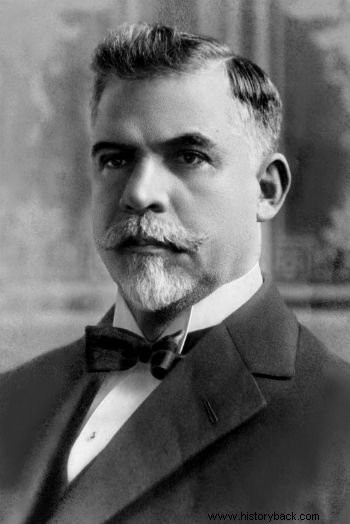Washington Luis was considered the last president of the period that became known as the Old Republic.
 Washington created the free food markets
Washington created the free food markets
Biography
Born in Rio de Janeiro, in the city of Macaé, on October 26, 1869, however, he considered himself a paulista and made his political career in the Paulista Republican Party (PRP), in addition to being a lawyer and historian.
Despite belonging to a poor family, he was a boarding student at Colégio Pedro II. He became known in Brazilian political history as a “modern” president, encouraging the development of techniques to improve administrative bureaucracy and technical-scientific management, as well as fostering scientific studies in historiography, museology and social sciences.
As president, Washington Luís sought to promote a policy of monetary and exchange rate balance for the financial sector. His government was devastated by the crisis of 1929, which almost destroyed the coffee sector, leading him to ask for help from the federal government, which was denied.
It was politically worn out due to the tenentist and workers' movements and the opposition of the dissident oligarchies, as well as the manifestations of the urban middle class.
Unsurprisingly, he was deposed on October 24, 1930 by the military coup headed by Getúlio Vargas, in the movement that became known as the 1930 Revolution.
After this event, he was exiled to the United States of America and Europe, returning to Brazil in 1957, when he died at the age of 87.
Political Trajectory of Washington Luís
First, Washington Luís was a councilor in 1897 and mayor in 1898 in the city of Batatais. Subsequently, he joins the Partido Republicano Paulista (PRP), and is elected state deputy in 1904.
In the year 1906, he leaves the Senate and goes to the State Secretariat of Justice and Public Security, where, among other things, he had to deal with the attacks of the Indians on the workers of the Northwest of Brazil railroad and the pioneers of the west of São Paulo.
Later, on January 15, 1914, he was elected mayor of the city of São Paulo, when he created the free food fairs and faced the 3 "Gs" World War I, the Spanish flu (1918) and the workers' strikes of 1917. , in addition to building and restoring 200 kilometers of municipal roads in São Paulo.
On May 1, 1920, he becomes governor of the state of São Paulo, establishing the guidelines for the population of the interior of the state through the construction of road works.
After passing through the Federal Senate, Washington Luís was elected to the presidency of the republic on March 1, 1926.
His government was marked by the confrontation of the international coffee crisis and the international financial crisis, which began in October 1929, with the crash of the New York Stock Exchange.
See also:First Republic